Unpackme I am Famous
Introduction
Because it is simply obvious that I have not been posting on this blog for a while, here is a post about Safedisc v3.
Last week I was studying this protection in deep, each component under IDA, but I accidentally broke my external hard drive by giving a shot in. I lost a lot of .idb from different games, softwares or malware, my personal toolz, unpackers, ...
So to smile again I decided to write about how to unpack this protection.
For those familiar with safedisc, the only interesting part will be Nanomites, restoring Imports or emulated opcodes is a joke when you know how older versions work.
Extra data
During introduction I talked about different components, they are placed at the end of the file.
The size of the target game is 1 830 912 bytes, but if we look IMAGE_SECTION_HEADER closely :
Name VirtSize VirtAddr SizeRaw PtrRaw Flags Pointing Directories
-------------------------------------------------------------------------------------------
.text 00131148h 00401000h 00132000h 00001000h 60000020h
.rdata 0002F497h 00533000h 00030000h 00133000h 40000040h Debug Data
.data 012CDCE8h 00563000h 0000D000h 00163000h C0000040h
.rsrc 0003289Eh 01831000h 00033000h 00170000h 40000040h Resource Table
stxt774 00002059h 01864000h 00003000h 001A4000h E0000020h
stxt371 00003358h 01867000h 00004000h 001A7000h E0000020h Import Table
Import Address Table
If we sum the last Real Offset and Real Size of stxt371 section :
>>> 0x1A7000 + 0x4000
1748992
>>> hex(0x1A7000 + 0x4000)
'0x1ab000'
1 748 992 bytes != 1 830 912 bytes.
Clearly there is some extra data at the end of the file.
By looking the main executable under IDA, I was able to find an interesting sub that retrieves and extracts those datas.
First, here is the structure used for extra data :
struct extra_data
{
DWORD sig_1;
DWORD sig_2;
DWORD num_file;
DWORD offset_1;
DWORD offset_2;
DWORD unknow_1;
DWORD unknow_2;
BYTE name[0xD];
};
sig_1 must always be set to 0xA8726B03 and sig_2 to 0xEF01996C
And after deleting all there (weak?) obfuscation, we can retrieve the following "pseudo code" to extract additionnal data.
do
{
SetFilePointer(hFile, actual_pos, NULL, FILE_BEGIN);
ReadFile(hFile, buff, 0x121, &bread, 0);
key = actual_pos;
for (i = 0; i < bread; i++)
{
key = key * 0x13C6A5;
key += 0x0D8430DED;
buff[i] ^= (((((key >> 0x10) ^ (key >> 0x8)) ^ (key >> 0x18)) ^ (key & 0xFF)) & 0xFF);
}
memcpy(&data, buff, sizeof(struct extra_data));
print_data_info(&data);
actual_pos += data.offset_1 + data.offset_2;
} while (data.sig_1 == 0xA8726B03 && data.sig_2 == 0xEF01996C);Result :
Name : ~def549.tmp
Num : 1
Name : clcd32.dll
Num : 1100
Name : clcd16.dll
Num : 1100
Name : mcp.dll
Num : 1101
Name : SECDRV.SYS
Num : 2
Name : DrvMgt.dll
Num : 2
Name : SecDrv04.VxD
Num : 11
Name : ~e5.0001
Num : 0
Name : PfdRun.pfd
Num : 0
Name : ~df394b.tmp
Num : 0
As you can see we can extract a lot of files, and here is the algorithm to decypher it :
ptr = (BYTE*)GlobalAlloc(GPTR, data.offset_1);
SetFilePointer(hFile, actual_pos - data.offset_1, NULL, FILE_BEGIN);
ReadFile(hFile, ptr, data.offset_1, &bread, NULL);
if (bread != data.offset_1)
{
printf("[-] ReadFile() failed\n");
exit(0);
}
key = 0x8142FEA1;
int init_key;
init_key = 0x8142FEA1;
for (i = 0; i < bread; i++)
{
key = init_key ^ 0x7F6D09ED;
ptr[i] = (((((key >> 0x18) ^ (key >> 0x10)) ^ (key >> 0x8))) & 0xFF) ^ ptr[i];
ptr[i] ^= key & 0xFF;
init_key = init_key << 0x8;
init_key += ptr[i];
}
Each component will be extracted into %temp% path, they got their own goal, we will not study all of them there is no interest.
- ~def549.tmp, a DLL, whose goal is to call different anti-debug technics (not interesting), check files on CD-ROM, ...
- ~e5.0001, an executable, this process will debug the main executable, for managing Nanomites.
- PfdRun.pfd, No type, This file will de decyphered for computing instruction table used for emulated opcodes.
- ~df394b.tmp, another DLL, Load and decyph section from other DLL, and manage debug event for ~e5.0001 process.
I will not discuss more about all this stuff, by loosing all my idb I am bored to reverse (rename sub) again and again with all this shitty C++ stuff, you can find some fun crypto when they decypher pfd file or code section, rijndael modified, different xor operation, anyway let's continue !
Find OEP
This is the easiest part :
stxt371:018670A2 mov ebx, offset start
stxt371:018670A7 xor ecx, ecx
stxt371:018670A9 mov cl, ds:byte_186703D
stxt371:018670AF test ecx, ecx
stxt371:018670B1 jz short loc_18670BF
stxt371:018670B3 mov eax, offset loc_1867113
stxt371:018670B8 sub eax, ebx
stxt371:018670BA sub eax, 5
stxt371:018670BD jmp short loc_18670CD
stxt371:018670BF ; ---------------------------------------------------------------------------
stxt371:018670BF
stxt371:018670BF loc_18670BF: ; CODE XREF: start+13j
stxt371:018670BF push ecx
stxt371:018670C0 mov ecx, offset loc_1867159
stxt371:018670C5 mov eax, ecx
stxt371:018670C7 sub eax, ebx
stxt371:018670C9 add eax, [ecx+1]
stxt371:018670CC pop ecx
stxt371:018670CD
stxt371:018670CD loc_18670CD: ; CODE XREF: start+1Fj
stxt371:018670CD mov byte ptr [ebx], 0E9h
stxt371:018670D0 mov [ebx+1], eax
This code will replace Module Entrypoint by a jump to Real OEP, so if you like using OllyDbg execute first instructions and put a breakpoint on that jump.
But you will encounter a "dead lock" problem, before jumping to real OEP, it decyphers sections, loads dll AND CreateProcess "~e5.0001" giving the pid of the game process as argument.
This process will load ~df394b.tmp aka SecServ.dll, all strings inside this dll are encrypted, we can decrypt all of them :
int decrypt_func_01(char *mem_alloc, char *addr_to_decrypt)
{
DWORD count;
DWORD key;
char actual;
if (mem_alloc && addr_to_decrypt)
{
count = 0;
key = 0x522CFDD0;
while (1)
{
actual = *addr_to_decrypt++;
actual = actual ^ (char)key;
*mem_alloc++ = actual;
key = 0xA065432A - 0x22BC897F * key;
if (!actual)
break;
if (count != 127)
{
count++;
continue;
}
return 0;
}
return 1;
}
else
return 0;
}Here is the result of all strings decyphered :
Addr = 667A9240 : drvmgt.dll
Addr = 667A9264 : secdrv.sys
Addr = 667A9298 : SecDrv04.VxD
Addr = 667A92BC : ALT_
Addr = 667A9C78 : Kernel32
Addr = 667AA71C : \\.\NTICE
Addr = 667AA73C : \\.\SICE
Addr = 667AA75C : \\.\SIWVID
Addr = 667AAB80 : .text
Addr = 667A9928 : Ntdll.dll
Addr = 667A9948 : Kernel32
Addr = 667AA3F0 : GetVersionExA
Addr = 667AA6BC : ZwQuerySystemInformation
Addr = 667AA6EC : NtQueryInformationProcess
Addr = 667AA780 : IsDebuggerPresent
Addr = 667AAB50 : ZwQuerySystemInformation
Addr = 667AADBC : ExitProcess
Addr = 667A99F8 : DeviceIoControl
Addr = 667A9A40 : CreateFileA
Addr = 667A9A64 : ReadProcessMemory
Addr = 667A9A8C : WriteProcessMemory
Addr = 667A9AB8 : VirtualProtect
Addr = 667A9AE0 : CreateProcessA
Addr = 667A9B08 : CreateProcessW
Addr = 667A9B30 : GetStartupInfoA
Addr = 667A9B58 : GetStartupInfoW
Addr = 667A9B80 : GetSystemTime
Addr = 667A9BA4 : GetSystemTimeAsFileTime
Addr = 667A9BD4 : TerminateProcess
Addr = 667A9BFC : Sleep
Addr = 667AB8C0 : WriteProcessMemory
Addr = 667AB8EC : FlushInstructionCache
Addr = 667AB918 : VirtualProtect
Addr = 667ABB90 : SetThreadContext
Addr = 667ABBB8 : GetThreadContext
Addr = 667ABBE0 : SuspendThread
Addr = 667ABB64 : FlushInstructionCache
Addr = 667ABB38 : WriteProcessMemory
Addr = 667ABC84 : ContinueDebugEvent
Addr = 667ABB0C : DebugActiveProcess
Addr = 667ABAE4 : WaitForDebugEvent
Addr = 667A99F8 : DeviceIoControl
Addr = 667ACF00 : System\CurrentControlSet\Services\VxD
Addr = 667ACF5C : cmapieng.vxd
Addr = 667ACF3C : StaticVxD
The most interesting things are DebugActiveProcess, ContinueDebugEvent, WriteProcessMemory, FlushInstructionCache, SetThreadContext.
As I said earlier this dll will be in charge of debugging the game process, it prevents debugging it with Olly or any Ring3 debugger.
The game process after calling CreateProcess will wait (WaitForSingleObject) signal that temp executable will attach to it and give it signal and continue to debug it, but if you are already debugging game process, WaitForSingleObject will never catch this signal.
All the code below can be found inside ~df394.tmp aka SecServ.dll :
.text:667250C1
.text:667250C1 loc_667250C1: ; CODE XREF: sub_66724FDE+D5j
.text:667250C1 push 0FFFFFFFFh ; dwMilliseconds
.text:667250C3 push edi ; hHandle
.text:667250C4 call ds:WaitForSingleObject
.text:667250CA push [ebp+hObject] ; hObject
.text:667250CD mov [ebp+return_value], eax
.text:667250D0 call esi ; CloseHandle
.text:667250D2 push edi ; hObject
.text:667250D3 call esi ; CloseHandle
.text:667250D5 cmp [ebp+return_value], 0 ; WAIT_OBJECT_0
.text:667250D9 pop edi
.text:667250DA pop esi
.text:667250DB jz short exit_func
.text:667250DD call ebx ; GetLastError
.text:667250DF call Exit_Process
.text:667250E4
.text:667250E4 exit_func: ; CODE XREF: sub_66724FDE+11j
.text:667250E4 ; sub_66724FDE+20j ...
.text:667250E4 pop ebx
.text:667250E5 leave
.text:667250E6 retn
.text:667250E6 sub_66724FDE endp
.text:667250E6
If you want to use OllyDBG, put a breakpoint on WaitForSingleObject call, and modify argument TIMEOUT to something different than INFINITE, and change ZF flag during the test of the return value.
Nanomites
Now the fun stuff can start, if you followed what I said, you can continue to debug game process, but at a moment you will encounter problem like follow :
.text:004519FC call ds:dword_5331B0 ; kernel32.IsBadReadPtr
.text:004519FC ; ---------------------------------------------------------------------------
.text:00451A02 db 0CCh
.text:00451A03 db 0CCh ;
.text:00451A04 db 0CCh ;
.text:00451A05 db 0CCh ;
What are doing these 0xCC (int 3) aka Trap to Debugger or software breakpoint after a call to a kernel32 API ?
It's a well known technique, instructions are replaced by this opcode and informations about the removed opcode is stored in a table. (Remember pfd file ?)
Then, by using self-debugging, when one of these breakpoints is hit, the debugging process will handle the debug exception, and will look up certain information about the debugging break.
- Is it a Nanomite ?
- Yes ! So I have to emulate the removed opcode
- And restore the context of the thread correctly
But the problem is, if Nanomites are called several times, it can impact a little the performance, right ? (Not anymore today), but Safedisc decided to count how much time a Nanomite is executed, and if this Nanomite is executed too much time, it will restore the replaced opcodes by writting it inside the debugged process.
So if we want to fix theses Nanomites, we just have to patch a branch instruction that say : "This nanomites has been executed too much time, restore opcode !", and scan txt section of game process to find all the nanomites, call them, and the debugger process will restore all the removed opcode :).
How To
When unpacking (real?) protection you need to write cool toolz, here are all the steps that I did :
- Create Game process in suspended state
- Inject a first (malicious?) dll into it and continue execution
- This first dll will setup an Hook on CreateProcessA, the goal of this task is when the debugger process ( ~e5.0001 ) will be created, it will change the dwCreationFlags to CREATE_SUSPENDED and inject a second dll in it.
- A second hook from the first dll will be setup on GetVersionExA to gain execution just after the jump to Real OEP.
- Once GetVersionExA is called, we scan txt section and look for 0xCC and for each one it create a thread at the address of the nanomites.
- The second dll will patch the branch condition for WriteProcessMemory the emulated opcode and hook SetThreadContext for terminating the thread in question and not continue his execution.
Need a diagram ?
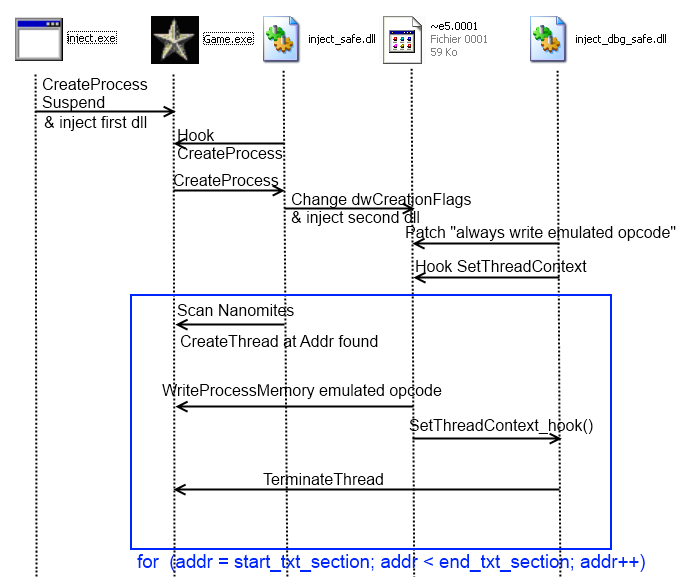
I encountered a little problem during those operation, if we create a thread at an addr containing 0xCC followed by nop operation (0x90), Safedisc debugger crashes or emulates shit...
Visual Studio uses 0xCC, 0x90 and 0x00 opcode for padding, don't ask me why they don't just use only 0x00, I don't know.
Just so you know, if you don't provide the full path of these dll while you are injecting it, the first dll must be placed in the folder of the game process, and the second one in %temp% path, because debugger process is extracted and executed here.
You can find the branch instruction inside ~def394.tmp (SecServ.dll) at addr 0x6678F562 :
.txt5:6678F562 cmp ax, 1
.txt5:6678F566 jnz not_write_process_memory
Result
Just some debug information :
---
Process id : 894
EventCode : 1
Exception Code : 80000003
Exception Addr : 40170F
---
[+] GetThreadContext(0xB8, 0x635080); return_addr = 66733C55
lpContext->EIP = 7C91120F
[+] WriteProcessMemory(0x5C, 0x40170F, 0x61F58C, 0x2, 0x61F0F0); return_addr = 6672BA45
85 C0
[+] SetThreadContext(0xB8, 0x635080); return_addr = 66733C23
lpContext->EIP = 40170F
---
As you can see at address 0x40170F, an event occured 0x1 -> EXCEPTION_DEBUG_EVENT and his code 0x80000003 (EXCEPTION_BREAKPOINT), so the debugger process replaces the 0xCC 0xCC by 0x85 0xC0 -> "test eax, eax", and try to SetThreadContext but we hooked it to terminate the thread.
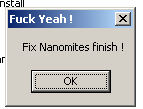
Restoring Imports
Like the previous version import points to some virtual address where the code calls routine to find the correct import.
By using algo against itself we can resolve all correct address of imports.
Inside txt section we can find different type of call to imports :
- call dword ptr[virtual_addr]
- jmp dword ptr[virtual_addr]
- jmp section Stxt774
The idea is simple, scan .txt section look for call dword ptr or jmp dword ptr or jmp section Stxt774, hook the function that resolve the api and get the result and save into into a linked list.
This function in question is in ~df394b.tmp :
.txt:6678D644 call resolve_api
.txt:6678D649 pop ecx
.txt:6678D64A pop ecx
Just replace the pop ecx, by "add esp, X; ret" and get the result into register eax.
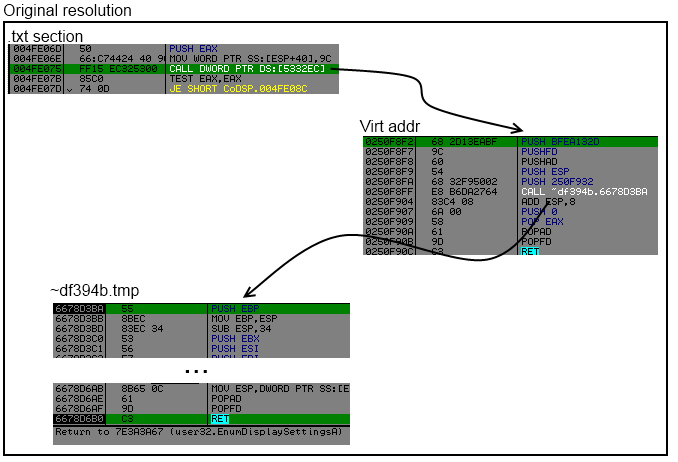
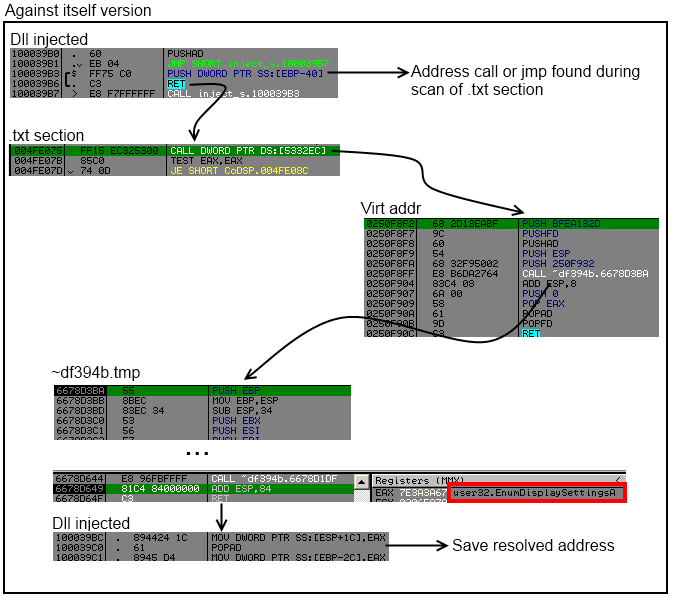
BUT ! Sometimes by calling the same virtual_addr but from other location it don't resolve the same API address.
API (0x7E3AC17E) has rdata.0x53327C (txt.0x51A656) rdata.0x53327C (txt.0x454509) rdata.0x53327C (txt.0x454149) rdata.0x533260 (txt.0x453773) rdata.0x53327C (txt.0x4535BD)
API (0x7E39869D) has rdata.0x53329C (txt.0x51A686) rdata.0x53329C (txt.0x50B64E) rdata.0x53329C (txt.0x50B1E4) rdata.0x53327C (txt.0x4FDC5E) rdata.0x53329C (txt.0x4FD7CA) rdata.0x533284 (txt.0x4FD718)
As you can see the address in rdata 0x53327C, can resolve different API when it is called from different locations (txt address).
To fix it, it's very simple we reorder the linked list according to the api address, and choose one rdata for each call, and we will change value of the call or jmp dword ptr at txt address for each entry of an api.
After reorder
Output after reordering :
API (0x7E3AC17E) has rdata.0x53327C (txt.0x51A656) rdata.0x53327C (txt.0x454509) rdata.0x53327C (txt.0x454149) rdata.0x53327C (txt.0x453773) rdata.0x53327C (txt.0x4535BD)
API (0x7E39869D) has rdata.0x53329C (txt.0x51A686) rdata.0x53329C (txt.0x50B64E) rdata.0x53329C (txt.0x50B1E4) rdata.0x53327C (txt.0x4FDC5E) rdata.0x53329C (txt.0x4FD7CA) rdata.0x533284 (txt.0x4FD718)
We can now write back into rdata addr the real adress of the api and fix the call or jmp at adress in txt section, to point to the good rdata address.
Now you can look with ImportRec and see that all imports are restored correctly :)
To fix jmp section Stxt774, we just have to replace the jmp by a call dword ptr[rdata], but wait jmp stxt774 is 5 bytes and we need 6 bytes to change it to call dword ptr, don't worry, after resolving the api and ret to it, the api will return at jmp stxt774 + 6, so there is enough place.
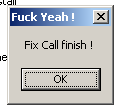
And Import Reconstructor is happy (Invalid imports 0) :
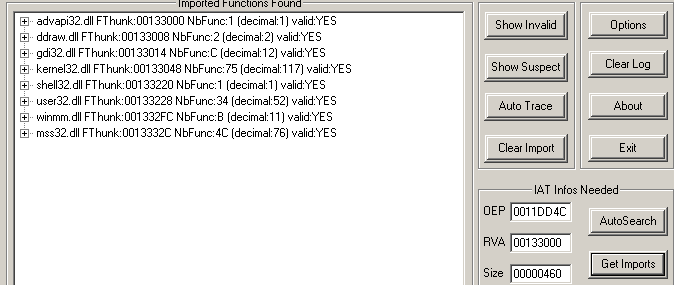
Emulated opcodes
After fixing Nanomites and restoring imports, I encounter a last problem.
.text:00404909 push ecx
.text:0040490A push eax
.text:0040490B call sub_4013F3
.text:0040490B sub_404909 endp ; sp-analysis failed
.text:0040490B
.text:004013F3 mov eax, 1E1Bh
.text:004013F8 pop ecx
.text:004013F9 lea eax, [eax+ecx]
.text:004013FC mov eax, [eax]
.text:004013FE jmp eax
This code will just compute an address in txt section, get the value pointed by this address and jump to it. The jump destination is an address from ~df394b.tmp.
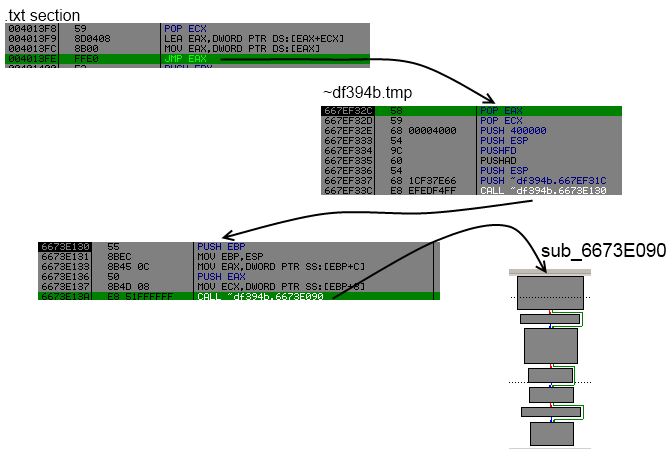
The goal of sub 0x6673E090 is simply to check from where it has been called, lookup in a table of emulated opcodes and restore it.
Here only one emulation is performed then it will write original opcode back.
Like for restoring imports, we find each reference to the sub 0x00404909, setup an hook at the end of the sub 0x6673E09, call each reference, and emulated opcodes will be restored automatically :)
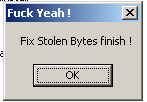
Conclusion
Safedisc v3 is really not difficult, you can find the source of all my codes at the end of this post.
I will go back to school project, hopefully graduating this year :)
Sources
Injector
First dll
Second dll
C and C
Introduction
If you are bored of my tutorial on safedisc just go to Bonus section for laughing.
Today we are going to see safedisc version 2 (in this case i worked on v2.05.030).
Detection
No more *.icd file, the loader is now integrated into the main executable.
The signature is the same : "BoG_ *90.0&!! Yy>" followed by 3 unsigned integers : the version, subversion an revision number.
Anti Debug
In this case we are using ring 3 debugger, the tricks are the same than in safedisc version 1 :
- IsDebuggerPresent()
- PEB!IsDebugged
- ZwQueryInformation (ProcessInformationClass = ProcessDebugPort)
You can use Phant0m plugin or follow what i did for safedisc 1.
Find OEP
Like I said in "detection" section, the loader is now integrated in the main executable, so we must find real oep after safedisc decyphering stuff.
I don't know if it's a good way to find it, but i set an hardware breakpoint on GetVersion, and look around for finding where am i. (GetVersion is one of the first called api).
But after watching some disas when i opened my ra2.exe into OllyDbg :
0041C1FD > 55 PUSH EBP
0041C1FE 8BEC MOV EBP,ESP
0041C200 60 PUSHAD
0041C201 B8 7BC24100 MOV EAX,Ra2.0041C27B
0041C206 2D FDC14100 SUB EAX,OFFSET Ra2.<ModuleEntryPoint>
0041C20B 0305 7CC24100 ADD EAX,DWORD PTR DS:[41C27C]
0041C211 C705 FDC14100 E>MOV DWORD PTR DS:[<ModuleEntryPoint>],0E9
0041C21B A3 FEC14100 MOV DWORD PTR DS:[41C1FE],EAX
0041C220 68 C9C04100 PUSH Ra2.0041C0C9 ; ASCII "USER32.dll"
0041C225 68 BBC04100 PUSH Ra2.0041C0BB ; ASCII "KERNEL32.dll"
0041C22A 68 09C04100 PUSH Ra2.0041C009
0041C22F 68 9BC04100 PUSH <&KERNEL32.GetModuleHandleA>
0041C234 A0 21C04100 MOV AL,BYTE PTR DS:[41C021]
0041C239 3C 01 CMP AL,1
0041C23B 74 07 JE SHORT Ra2.0041C244
0041C23D B8 00000000 MOV EAX,0
0041C242 EB 03 JMP SHORT Ra2.0041C247
0041C244 8B45 08 MOV EAX,DWORD PTR SS:[EBP+8]
0041C247 50 PUSH EAX
0041C248 E8 33000000 CALL Ra2.0041C280
0041C24D 83C4 14 ADD ESP,14
0041C250 83F8 00 CMP EAX,0
0041C253 74 1C JE SHORT Ra2.0041C271
0041C255 C705 FDC14100 C>MOV DWORD PTR DS:[<ModuleEntryPoint>],0C2
0041C25F C705 FEC14100 0>MOV DWORD PTR DS:[41C1FE],0C
0041C269 50 PUSH EAX
0041C26A A1 ABC04100 MOV EAX,DWORD PTR DS:[<&KERNEL32.ExitProcess>]
0041C26F FFD0 CALL EAX
0041C271 61 POPAD
0041C272 5D POP EBP
0041C273 EB 06 JMP SHORT Ra2.0041C27B
0041C275 72 16 JB SHORT Ra2.0041C28D
0041C277 61 POPAD
0041C278 1360 0D ADC ESP,DWORD PTR DS:[EAX+D]
0041C27B - E9 FFB5FEFF JMP Ra2.0040787F
Look at 0x0041C271, popad (we restore all our registers), pop ebp, jmp to 0x0041C27B, and again a jump to ... OEP.
After setting an hbp at this address we are here :
0040787F 55 PUSH EBP
00407880 8BEC MOV EBP,ESP
00407882 6A FF PUSH -1
00407884 68 78234100 PUSH Ra2.00412378
00407889 68 E4C54000 PUSH Ra2.0040C5E4
Fix redirect call
In this version of safedisc 2, it's the same difficulty in my opinion, but it's take more time to write call fixer, because there are some funny anti dump tricks.
Let's see the call jsut after oep :
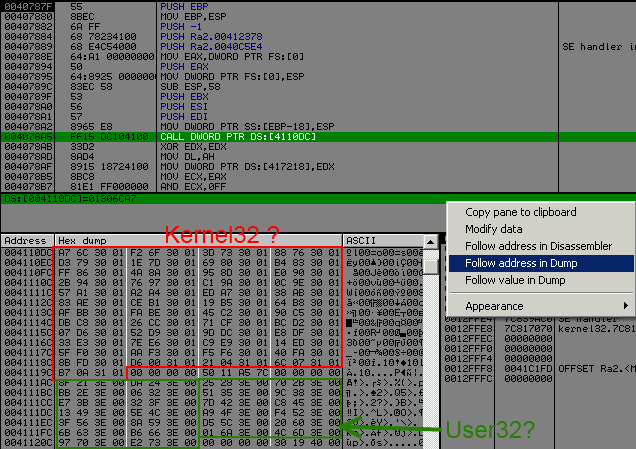
It looks like version 1, but they set up new "protection" for fixing it.
I will not get into detail but explain you what they did and how to defeat it.
01306CA7 68 B413EABF PUSH BFEA13B4
01306CAC 9C PUSHFD
01306CAD 60 PUSHAD
01306CAE 54 PUSH ESP
01306CAF 68 E76C3001 PUSH 1306CE7
01306CB4 E8 3729D10E CALL ~df394b.100195F0
01306CB9 83C4 08 ADD ESP,8
01306CBC 6A 00 PUSH 0
01306CBE 58 POP EAX
01306CBF 61 POPAD
01306CC0 9D POPFD
01306CC1 C3 RET
Routine are exactly the same than my previous post about version 1 subersion 41, they compute the addr and then ret to it.
BUT ! now they check on the stack from where you have called this routine, and if it's an unknow address, it will compute a random api address.
So when we will want to fix import, we will have to scan code section find 0xFF15 (call dword [rdata]) and push the addr + 6.
I will spare you from crash, because it's not the only protection ... after making a call fixer, i encoutered a second problem, you can have several call to the same offset to rdata section, and in function of where you called it it will compute different api address :
0040521E CALL DWORD PTR DS:[4110F4] ; Return to 7C91FE01 (ntdll.RtlGetLastWin32Error)
004078F3 CALL DWORD PTR DS:[4110F4] ; Return to 7C812FAD (kernel32.GetCommandLineA)
As you can these 2 calls call the same routine, but ret on different api.
So for our call fixer we will have to create a temporary kernel32 and user32 table, and fix each call dword ptr to call the good index :
- Make a temporary dword table size of nb api, fill with null at start
- Scan code section, compute address api with safedisc routine
- Hook return safedisc routine, and put address into a register
- If computed address is not known find place (null bytes) into temporary table, and fix destination of the call dword ptr with new index into the table.
- If computed adress is already known and index into the table didn't change, do nothing, else fix destination of the call dword ptr.
- When done juste memcpy new table
How to hook safedisc routine ?
100183DF FF15 44800310 CALL DWORD PTR DS:[<&KERNEL32.SetEvent>] ; kernel32.SetEvent
100183E5 /EB 07 JMP SHORT ~df394b.100183EE
100183E7 8BDB MOV EBX,EBX
100183E9 /70 06 JO SHORT ~df394b.100183F1
100183EB |90 NOP
100183EC /71 03 JNO SHORT ~df394b.100183F1
100183EE ^\EB F7 JMP SHORT ~df394b.100183E7
100183F1 8B65 0C MOV ESP,DWORD PTR SS:[EBP+C]
100183F4 61 POPAD
100183F5 9D POPFD
100183F6 C3 RET
We will remplace the JMP SHORT ~df394b.100183EE, to jump to our code (in my case i used a dll, why because dll injection FTW !, no it's a simply way to fuck this anti dump, and not assemble code in ollydbg each time, yes safedisc 2 call fixer is longer than safedisc 1).
So if you are following my tuts and code some shit, your dump will crash... we need to fix 3 more tricks.
The problem is mov REG, [rdata] ... call REG :
References in Ra2:.text to 00411084..00411087, item 3
Address=0040E719
Disassembly=MOV ESI,DWORD PTR DS:[411084]
Comment=DS:[00411084]=01302435
References in Ra2:.text to 004110A4..004110A7, item 0
Address=0040350E
Disassembly=MOV EBP,DWORD PTR DS:[4110A4]
Comment=DS:[004110A4]=01303E8D
References in Ra2:.text to 00411124..00411127, item 0
Address=0040310F
Disassembly=MOV EBX,DWORD PTR DS:[411124]
Comment=DS:[00411124]=0130A7ED
References in Ra2:.text to 00411130..00411133, item 0
Address=00402CF5
Disassembly=MOV EDI,DWORD PTR DS:[411130]
Comment=DS:[00411130]=0130B1CE
So we will need to fix mov edi, [rdata], ebp, ebx, edi, see my call fixer for explanation but same thing like before.
An another tricks is jmp to Stxt774 a section found inside the binary.
0040C488 - E9 98EB0000 JMP Ra2.0041B025
....
0041B025 53 PUSH EBX
0041B026 E8 00000000 CALL Ra2.0041B02B
0041B02B 870424 XCHG DWORD PTR SS:[ESP],EAX
0041B02E 9C PUSHFD
0041B02F 05 D5FFFFFF ADD EAX,-2B
0041B034 8B18 MOV EBX,DWORD PTR DS:[EAX]
0041B036 6BDB 01 IMUL EBX,EBX,1
0041B039 0358 04 ADD EBX,DWORD PTR DS:[EAX+4]
0041B03C 9D POPFD
0041B03D 58 POP EAX
0041B03E 871C24 XCHG DWORD PTR SS:[ESP],EBX
0041B041 C3 RET
This routine will just compute an addr to rdata section, and ret to it, so for fixing this we will have to replace jmp by call [rdata], but wait jmp addr it's only 5 bytes and call [rdata] is equals 6 bytes, but don't worry when we will ret from this routine we will ret at 0x0040C488 + 6 (in the example above), so we have enough place to fix it.
And the last tricks is similar than this one seen below, it is jmp [rdata], and we have enough place too for fixing it too.
Now you have all the pieces to understand my fix import dll :
.386
.model flat,stdcall
option casemap:none
include \masm32\include\kernel32.inc
includelib \masm32\lib\kernel32.lib
.const
; user32 addr rdata start
user32_rdata = 004111ACh
; kernel32 addr rdata start
kernel32_rdata = 0041105Ch
code_start = 00401000h
code_end = 00411000h
code_size = 00010000h
; Addr to patch for our hook
addr_to_patch = 100183E5h
start_rdata = 00411000h
size_rdata = 00003000h
stxt_section = 0041B000h
stxt_end = stxt_section + 00001000h
.data?
OldProtect dd ?
addrcall dd 9 dup (?)
nbwrite dd ?
addrapi dd ?
not_real dd ?
kernel32_table dw 051h dup (?,?,?,?)
user32_table dw 01Ah dup (?,?,?,?)
.code
LibMain proc parameter1:DWORD, parameter2:DWORD, parameter3:DWORD
pushad
pushfd
; Set full access for beeing able to fix jmp to call and rdata section
invoke VirtualProtect, addr_to_patch, 5, 40h, addr OldProtect
invoke VirtualProtect, code_start, code_size, 40h, addr OldProtect
invoke VirtualProtect, start_rdata, size_rdata, 40h, addr OldProtect
; Set hook
mov eax, addr_to_patch
mov byte ptr [eax], 0E9h
mov [eax + 1], Hook - addr_to_patch - 5
; Scan section text
SearchCall:
mov eax, code_start
Scantext:
inc eax
cmp eax, code_end
jae end_scan
cmp word ptr[eax], 015FFh ; call [rdata]
je call_type1
cmp word ptr[eax], 025FFh ; Jmp [rdata]
je call_type1
cmp word ptr[eax], 0358Bh ; MOV ESI, ...
je call_type1
cmp word ptr[eax], 02D8Bh ; MOV EBP, ...
je call_type1
cmp word ptr[eax], 01D8Bh ; MOV EBX, ...
je call_type1
cmp word ptr[eax], 03D8Bh ; MOV EDI, ...
je call_type1
cmp byte ptr[eax], 0E9h ; Jmp Stxt774
je jmp_type
jmp Scantext
end_scan:
; copy temporary table to original position
mov ecx, 051h
lea esi, kernel32_table
mov edi, kernel32_rdata
rep movsd
mov ecx, 01Ah
lea esi, user32_table
mov edi, user32_rdata
rep movsd
mov eax, 1
popfd
popad
retn
; Our hook function edx = addr of the resolved api
Hook:
mov [addrapi], edx
mov esp, dword ptr ss:[ebp + 0Ch]
popad
popfd
pop edi
pop edi
retn
; fix jump
jmp_type:
mov edx, [eax + 1]
lea edx, [edx + eax + 5]
.if edx >= stxt_section && edx <= stxt_end
push next_jmp
jmp edx
.endif
jmp Scantext
next_jmp:
xor ecx, ecx
mov ebx, [addrapi]
; is a jump to user32 or kernel32 rdata
.if ebx >= 07E000000h
lea edi, user32_table
mov esi, user32_rdata
.else
lea edi, kernel32_table
mov esi, kernel32_rdata
.endif
.while (dword ptr [edi + ecx * 4] != 0)
.if dword ptr [edi + ecx * 4] == ebx
mov word ptr[eax], 015FFh
mov edx, esi
lea edx, [edx + ecx * 4]
mov dword ptr [eax + 2], edx
jmp @F
.endif
inc ecx
.endw
mov dword ptr [edi + ecx * 4], ebx
mov word ptr[eax], 015FFh
mov edx, esi
lea edx, [edx + ecx * 4]
mov dword ptr [eax + 2], edx
@@:
jmp Scantext
; We will scan if the ptr to rdata section
; is in kernel32 table or go check if it is
; in user32 table
call_type1:
mov edx, [eax + 2]
mov ebx, kernel32_rdata
next_kernel32:
cmp dword ptr [ebx], 0
je user32
cmp ebx, edx
je is_kernel32
add ebx, 4
jmp next_kernel32
; We found it, let's fix this
is_kernel32:
push next_scan
mov ecx, eax
add ecx, 6
push ecx
jmp dword ptr [ebx]
next_scan:
xor ecx, ecx
mov ebx, [addrapi]
.while (dword ptr [kernel32_table + ecx * 4] != 0)
.if dword ptr [kernel32_table + ecx * 4] == ebx
mov edx, kernel32_rdata
lea edx, [edx + ecx * 4]
; fix index
mov dword ptr [eax + 2], edx
jmp @F
.endif
inc ecx
.endw
mov dword ptr [kernel32_table + ecx * 4], ebx
mov edx, kernel32_rdata
lea edx, [edx + ecx * 4]
mov dword ptr [eax + 2], edx
@@:
jmp Scantext
; Same thing like below but for user32
user32:
mov edx, [eax + 2]
mov ebx, user32_rdata
next_user32:
cmp dword ptr [ebx], 0
je Scantext
cmp ebx, edx
je is_user32
add ebx, 4
jmp next_user32
is_user32:
push next_scan_user32
mov ecx, eax
add ecx, 6
push ecx
jmp dword ptr [ebx]
next_scan_user32:
xor ecx, ecx
mov ebx, [addrapi]
.while (dword ptr [user32_table + ecx * 4] != 0)
.if dword ptr [user32_table + ecx * 4] == ebx
mov edx, user32_rdata
lea edx, [edx + ecx * 4]
mov dword ptr [eax + 2], edx
jmp @F
.endif
inc ecx
.endw
mov dword ptr [user32_table + ecx * 4], ebx
mov edx, user32_rdata
lea edx, [edx + ecx * 4]
mov dword ptr [eax + 2], edx
@@:
jmp Scantext
LibMain endp
end LibMain
And the make.bat :
@echo off
if exist "inject.obj" del "inject.obj"
if exist "inject.dll" del "inject.dll"
\masm32\bin\ml /c /coff "inject.asm"
if errorlevel 1 goto end
\masm32\bin\Link /SUBSYSTEM:WINDOWS /DLL "inject.obj"
if errorlevel 1 goto end
:end
pause
For injecting the dll, i used a olly plugin writtent by baboon, big thanks to him :]
Then after injecting dll, dump process, use importrec, and enjoy !
Bonus
And now ! the lulz part :]
In the folder of red alert 2, we can see ra2.exe (protected by safedisc) and game.exe (not protected), ra2.exe will simply launch game.exe. So removing safedisc was a long solution for breaking it.
But they used lame protection to watch if the process was launched by ra2.exe or not.
004916E4 |. 50 PUSH EAX ; /MutexName => "48BC11BD-C4D7-466b-8A31-C6ABBAD47B3E"
004916E5 |. 6A 00 PUSH 0 ; |InitialOwner = FALSE
004916E7 |. 6A 00 PUSH 0 ; |pSecurity = NULL
004916E9 |. FF15 30527800 CALL DWORD PTR DS:[<&KERNEL32.CreateMutexA>] ; \CreateMutexA
004916EF |. 8BF0 MOV ESI,EAX
004916F1 |. FF15 F0517800 CALL DWORD PTR DS:[<&KERNEL32.GetLastError>] ; [GetLastError
004916F7 |. 3D B7000000 CMP EAX,0B7
004916FC |. 0F94C3 SETE BL
004916FF |. 85F6 TEST ESI,ESI
00491701 |. 74 07 JE SHORT game2.0049170A
What !? They are just checking if a mutex has been created or not, ok let's nop this.
A second check is :
0049173A |. 68 20037C00 PUSH game2.007C0320 ; /EventName = "D6E7FC97-64F9-4d28-B52C-754EDF721C6F"
0049173F |. 6A 01 PUSH 1 ; |Inheritable = TRUE
00491741 |. 6A 02 PUSH 2 ; |Access = 2
00491743 |. FF15 28527800 CALL DWORD PTR DS:[<&KERNEL32.OpenEventA>] ; \OpenEventA
00491749 |. 8BF0 MOV ESI,EAX
0049174B |. 85F6 TEST ESI,ESI
0049174D |. 74 22 JE SHORT game2.00491771
Ok a check if OpenEventA worked or not let's nop it too.
Kind of triggers ?
But there is another problem if we fix game.exe, i started a skirmish party for lulz, and after 15 seconds of playing the computer (IA) leave the match and i am victorius. WTF ?!
Ok it's clear the launcher (ra2.exe) send message throw PostThreadMessage() and game.exe set a value if a received well this message :
00491791 |. 8BF1 MOV ESI,ECX
00491793 |. 817E 04 EFBE0>CMP DWORD PTR DS:[ESI+4],0BEEF
0049179A |. 75 4A JNZ SHORT game2.004917E6
0049179C |. 68 A4037C00 PUSH game2.007C03A4
004917A1 |. E8 4A51F7FF CALL game2.004068F0
004917A6 |. 8B46 0C MOV EAX,DWORD PTR DS:[ESI+C]
004917A9 |. 83C4 04 ADD ESP,4
004917AC |. 6A 00 PUSH 0 /BaseAddr = NULL
004917AE |. 6A 00 PUSH 0 |MapSize = 0
004917B0 |. 6A 00 PUSH 0 |OffsetLow = 0
004917B2 |. 6A 00 PUSH 0 |OffsetHigh = 0
004917B4 |. 68 1F000F00 PUSH 0F001F |AccessMode = F001F
004917B9 |. 50 PUSH EAX |hMapObject
004917BA |. FF15 24527800 CALL DWORD PTR DS:[<&KERNEL32.MapViewOfFileEx>] \MapViewOfFileEx
004917C0 |. 85C0 TEST EAX,EAX
004917C2 |. A3 4C9E8300 MOV DWORD PTR DS:[839E4C],EAX
This routine is called for checking the type of message in our case 0xBEEF, and then if the MapViewOfFileEx() is well done, it will set a value in 0x839E4C. By watching reference to this immediate constant, we can see this :
004917FA |. A1 4C9E8300 MOV EAX,DWORD PTR DS:[839E4C]
004917FF |. 83C4 04 ADD ESP,4
00491802 |. 85C0 TEST EAX,EAX
00491804 |. 75 03 JNZ SHORT game2.00491809
00491806 32C0 XOR AL,AL
00491808 |. C3 RET
Just replace xor al, al by mov al, 1 and (trigger?) is fix.
Subversion 41
Introduction
No this is post will not be about SVN (a software versioning).
We will just see a litlle difference in the subversion 41 of safedisc 1.
I invite you to read this post about version 1, before reading this.
Anti debug
It is the same stuff than before, you have to use EBFE tricks too.
This part is exactly the same than the previous post.
Call redirection
Each call to Kernel32 or User32 api, are done through dplayerx.dll as usual :
013E5BD5 68 6712EABF PUSH BFEA1267
013E5BDA 9C PUSHFD
013E5BDB 60 PUSHAD
013E5BDC 54 PUSH ESP
013E5BDD 68 1B000000 PUSH 1B
013E5BE2 68 00000000 PUSH 0
013E5BE7 FF15 F75B3E01 CALL DWORD PTR DS:[13E5BF7] ; dplayerx.00E75310
013E5BED 83C4 0C ADD ESP,0C
013E5BF0 6A 00 PUSH 0
013E5BF2 58 POP EAX
013E5BF3 61 POPAD
013E5BF4 9D POPFD
013E5BF5 C3 RET
But in this revision for each api you will have to push a predefined value (random?) like 0xBFEA1267 in this example.
We can see the number of the api to call, and 0 or 1 for kernel32 or user32.
But ! after the call, we haven't got a jmp dword for jumping to the resolved address api
Because now the routine dplayerx.00E75310, will GetProcAddress() and then ret to this address, code at 0x013E5BED will never be executed.
So we must fix the previous code for fixing the iat :
013E36C5 33DB XOR EBX,EBX
013E36C7 BA 50F04C00 MOV EDX,OFFSET SC3U.__imp__GetStartupInfoA@4 ; MOV EDX,4CF050 start rdata kernel32 redirection
013E36CC 8B02 MOV EAX,DWORD PTR DS:[EDX]
013E36CE 8B40 01 MOV EAX,DWORD PTR DS:[EAX+1] ; Retrive the (random) value
013E36D1 50 PUSH EAX
013E36D2 9C PUSHFD
013E36D3 60 PUSHAD
013E36D4 54 PUSH ESP
013E36D5 6A 10 PUSH EBX ; Numero api
013E36D7 6A 00 PUSH 0 ; 0 (Kernel32)
013E36D9 FF15 AB363E01 CALL DWORD PTR DS:[13E36AB] ; dplayerx.00E35310
013E36DF 8B4424 14 MOV EAX,DWORD PTR SS:[ESP+14] ; Addr of api
013E36E3 A3 F0BF4F00 MOV DWORD PTR DS:[4FBFF0],EAX ; Save it
013E36E8 61 POPAD
013E36E9 9D POPFD
013E36EA A1 F0BF4F00 MOV EAX,DWORD PTR DS:[4FBFF0]
013E36EF 8902 MOV DWORD PTR DS:[EDX],EAX ; Fix
013E36F1 43 INC EBX ; Next api
013E36F2 83FB 50 CMP EBX,50 ; No more api ?
013E36F5 74 06 JE SHORT 013E36FD
013E36F7 83C2 04 ADD EDX,4
013E36FA ^ EB D0 JMP SHORT 013E36CC
013E36FA CC INT3
Don't forget to set full access(write) to your rdata section.
And now let's patch in dplayerx.dll :
00E33B13 8B65 0C MOV ESP,DWORD PTR SS:[EBP+C]
00E33B16 61 POPAD
00E33B17 9D POPFD
00E33B18 C3 RET
We will nop the popad and popfd instruction and replace ret by a jmp to our code (just after call instruction) :
00E33B13 8B65 0C MOV ESP,DWORD PTR SS:[EBP+C]
00E33B16 90 NOP
00E33B17 90 NOP
00E33B18 - E9 C2FB5A00 JMP 013E36DF
Now set new origin, run it,then do the same thing with user32 api, change edx start value,push 0 by push 1, and 50 by 29. Now you can dump fix the iat with ImportRec and enjoy your game :]
Conlusion
This post is not very important but just to see a little difference, and how to fix it.
Btw today is Saturday, girlz go shopping for new shoes, guyz buy their alcohol for saturday night party, and me I wrote a list of fun (protection) games and buy some of them :
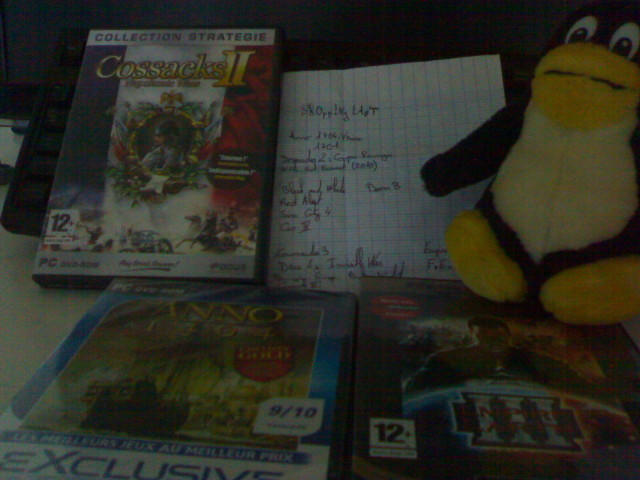
I just need time for beeing able to publish my research about this new stuff.
Unsafedisc
Introduction
I'm actually doing an internship, so it's difficult to work on my personal project.
But today i found some times to finish the first release of my unsafedisc, actually it will work
only with version 1.11.0 because i haven't got enough game with safedisc protection.
But when i will touch my pay, i will have the possibility to buy some old school games :]
Tiny Encryption Algorithm
In my last post about safedisc, i said dplayerx.dll was here for decrypting some sections of the icd file, like .data and .text. I reversed all the stuff from this dll, there is a lot obfuscation inside by using stc, jb, jmp instruction, the only solution i found was to trace the code and reconstruct with my own hand. If you want to check the decrypt routine look at the begining of segment text2 inside dplayerx.dll.
The interesting thing to know is the key that is present in this form :
ABCD - ABCD - ABCD - ABCD
It uses a 128-bit key with the same 32-bit pattern.
So we are able to bruteforce it, but how to know it's the good key ?
At the begining i was thinking about decrypting the 64-bit blocks where oep is, and check if the value equal to push ebp, mov ebp, esp (0x55 0x89 0xe5), but it's not enough, it was a really bad idea.
After switching on my brain, i looked at .data section :
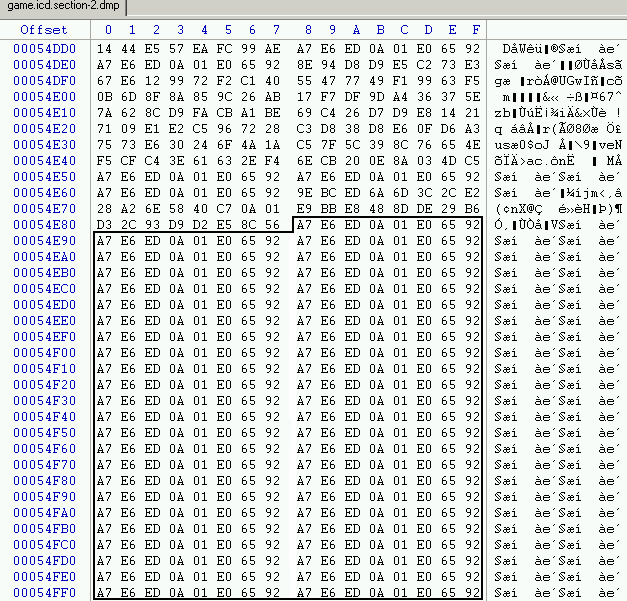
We can easily see the same pattern : 0xA7E6ED0A 0x01E06592, TEA use electronic codebook mode (ECB), if we got in our example two 64-bit block of "0" they will have the same cipher.
With the end of section data, we are able to bruteforce easily the key :].
Monte Carlo algorithm
The last part for breaking safedisc, is reconstruct all the iat. By reading information from woodmann, and my reversed stuff from dplayerx.dll especially this routine :
00D42420 51 PUSH ECX
00D42421 8B4424 10 MOV EAX,DWORD PTR SS:[ESP+10] ; tea key
00D42425 53 PUSH EBX
00D42426 8B5C24 0C MOV EBX,DWORD PTR SS:[ESP+C] ; Allocated memory
00D4242A 55 PUSH EBP
00D4242B 56 PUSH ESI
00D4242C 8B7424 18 MOV ESI,DWORD PTR SS:[ESP+18] ; Nb max api 0x99 or 0x5c
00D42430 33ED XOR EBP,EBP
00D42432 33C9 XOR ECX,ECX
00D42434 57 PUSH EDI
00D42435 8B38 MOV EDI,DWORD PTR DS:[EAX]
00D42437 3BF5 CMP ESI,EBP
00D42439 896C24 10 MOV DWORD PTR SS:[ESP+10],EBP
00D4243D 76 11 JBE SHORT dplayerx.00D42450
00D4243F 33C0 XOR EAX,EAX
00D42441 41 INC ECX
00D42442 890483 MOV DWORD PTR DS:[EBX+EAX*4],EAX
00D42445 8BC1 MOV EAX,ECX
00D42447 25 FFFF0000 AND EAX,0FFFF
00D4244C 3BC6 CMP EAX,ESI
00D4244E ^ 72 F1 JB SHORT dplayerx.00D42441
00D42450 3BF5 CMP ESI,EBP
00D42452 76 5E JBE SHORT dplayerx.00D424B2
00D42454 69FF 6D5AE835 IMUL EDI,EDI,35E85A6D
00D4245A 33D2 XOR EDX,EDX
00D4245C 81C7 E9621936 ADD EDI,361962E9
00D42462 85F6 TEST ESI,ESI
00D42464 8BC6 MOV EAX,ESI
00D42466 74 05 JE SHORT dplayerx.00D4246D
00D42468 42 INC EDX
00D42469 D1E8 SHR EAX,1
00D4246B ^ 75 FB JNZ SHORT dplayerx.00D42468
00D4246D 81E2 FFFF0000 AND EDX,0FFFF
00D42473 8BC7 MOV EAX,EDI
00D42475 8BCA MOV ECX,EDX
00D42477 D3E8 SHR EAX,CL
00D42479 B9 20000000 MOV ECX,20
00D4247E 2BCA SUB ECX,EDX
00D42480 0FAFC6 IMUL EAX,ESI
00D42483 D3E8 SHR EAX,CL
00D42485 8BCD MOV ECX,EBP
00D42487 81E1 FFFF0000 AND ECX,0FFFF
00D4248D 3BC1 CMP EAX,ECX
00D4248F 74 14 JE SHORT dplayerx.00D424A5
00D42491 8B148B MOV EDX,DWORD PTR DS:[EBX+ECX*4]
00D42494 895424 20 MOV DWORD PTR SS:[ESP+20],EDX
00D42498 8B1483 MOV EDX,DWORD PTR DS:[EBX+EAX*4]
00D4249B 89148B MOV DWORD PTR DS:[EBX+ECX*4],EDX
00D4249E 8B4C24 20 MOV ECX,DWORD PTR SS:[ESP+20]
00D424A2 890C83 MOV DWORD PTR DS:[EBX+EAX*4],ECX
00D424A5 45 INC EBP
00D424A6 8BD5 MOV EDX,EBP
00D424A8 81E2 FFFF0000 AND EDX,0FFFF
00D424AE 3BD6 CMP EDX,ESI
00D424B0 ^ 72 A2 JB SHORT dplayerx.00D42454
00D424B2 5F POP EDI
00D424B3 5E POP ESI
00D424B4 5D POP EBP
00D424B5 5B POP EBX
00D424B6 59 POP ECX
00D424B7 C3 RET
This routine will just build a table of ascending dwords, with a size of nb api, and sort the table into the correct order, using two consts, and morphing the decrypt key with them.
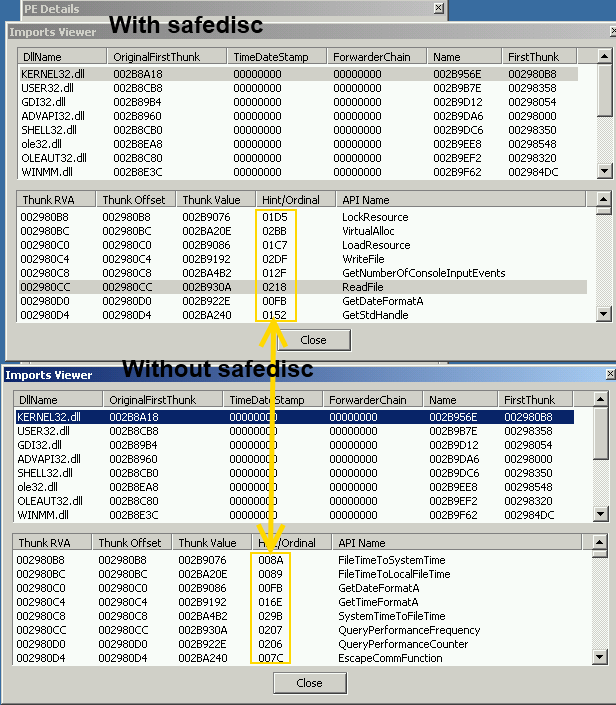
As you can see all the ordinal value of each IMAGE_THUNK_DATA differ, we have to reverse their algorithm for reconstruct well all IMAGE_THUNK_DATA.
Conclusion
That's all for understanding all the suff i coded in masm : my_unsafedisc.rar.
Screenshot
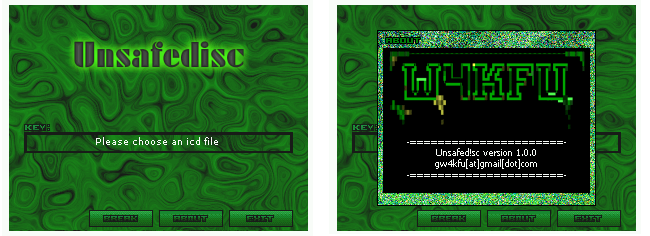
NOD or GDI
Introduction
It's my first english article so please be cool.
If you haven't noticed yet, I (only) like old video games (see SNES), today i'm going to play with Red Alert : Tiberian Sun.
This game is protected by an old commercial protection : Safedisc aka C-dilla.
Detection
Safedisc version 1 can be recognized by several files on the CD :
- 00000001.TMP
- CLOKSPL.EXE
- DPLAYERX.DLL
- SECDRV.SYS
And also the existence of two executables, Game.EXE and Game.ICD.
We can also recognize this protection by her signature :

The signature is "BoG_ *90.0&!! Yy>" followed by 3 unsigned integers : the version, subversion an revision number.
Or simply by using Protection ID :

So in this article we will talk about how to defeat Safedisc version 1.11.0000 using a ring3 debugger.
Yes because all over the internet, i just found article / tutorial using Softice.
Anti Debug
So let's open Game.exe into OllyDbg.
We can found two anti debug tricks related to a ring 3 debugger.
The first anti debug trick is several call to IsDebuggerPresent(), and they also check this manually :
004212C6 . 64:A1 1800000>MOV EAX,DWORD PTR FS:[18]
004212CC . 8B48 30 MOV ECX,DWORD PTR DS:[EAX+30]
004212CF . 0FB641 02 MOVZX EAX,BYTE PTR DS:[ECX+2]
004212D3 . 85C0 TEST EAX,EAX
So by putting this code where you want, and change the origin ("New origin here" => Ctrl + Gray *), we can defeat this trick.
004197C5 64:A1 1800000>MOV EAX,DWORD PTR FS:[18]
004197CB 8B40 30 MOV EAX,DWORD PTR DS:[EAX+30]
004197CE 83C0 02 ADD EAX,2
004197D1 C600 00 MOV BYTE PTR DS:[EAX],0
00419E35 ^\E9 5675FFFF JMP GAME.<ModuleEntryPoint>
The second trick is several call to ZwQueryInformationProcess(), with ProcessInformationClass argument set to ProcessDebugPort for checking if the process is being run under the control of a ring 3 debugger.
I know, it can be simply bypass by using the Phant0m plugin, but i wanted to write a script to defeat it :
var is_ProcessDebugPort
var buffer
var ZwQueryInformationProcess
gpa "ZwQueryInformationProcess", "ntdll.dll"
bphws $RESULT, "x"
mov ZwQueryInformationProcess, $RESULT
add $RESULT, C
bphws $RESULT, "x"
mov is_ProcessDebugPort, 0
cnt:
eob break
run
break:
cmp eip, ZwQueryInformationProcess
je begin_zwqueryinformationprocess
end_zwqueryinformationprocess:
cmp is_ProcessDebugPort, 1
jne cnt
mov is_ProcessDebugPort, 0
mov [buffer], 0
jmp cnt
begin_zwqueryinformationprocess:
cmp [esp + 8], 7
jne cnt
mov buffer, [esp + C]
log buffer
mov is_ProcessDebugPort, 1
jmp cnt
Explanation :
- Put an hardware breakpoint at the entry point of the function, and at the end.
- Check if the function was called with ProcessInformationClass argument = ProcessDebugPort ( 0x7 ).
- If it was called with the fact mentionned before, we set the buffer to 0 (The process is not being run under ring 3 debugger).
No we can work with our executables without problems.
There are another anti debug tricks, like calls to CreateFileA() with argument : "\.SICE" and "\.NTICE", for checking is softice is running.
Also in this version, they load a driver (secdrv.sys) but i have noticed nothing about anti debug techniques.
I don't know what the purpose of this driver
in this version of safedisc (1.11.0000), i tried to do some shit with DeviceIoControl() api but without result.
Apparently, the driver is safe in this version while others are : CVE-2007-5587.
*.ICD
At the beginning of the post, I mentionned the existence of two files Game.EXE and Game.ICD.
Game.EXE executable is only a loader which decrypts and loads the protected game executable in the encrypted ICD file :


Safedisc uses a debug locker technique with buffer overflow to the start the real executable (ICD file).
So let's see the buffer used by WriteProcessMemory() :
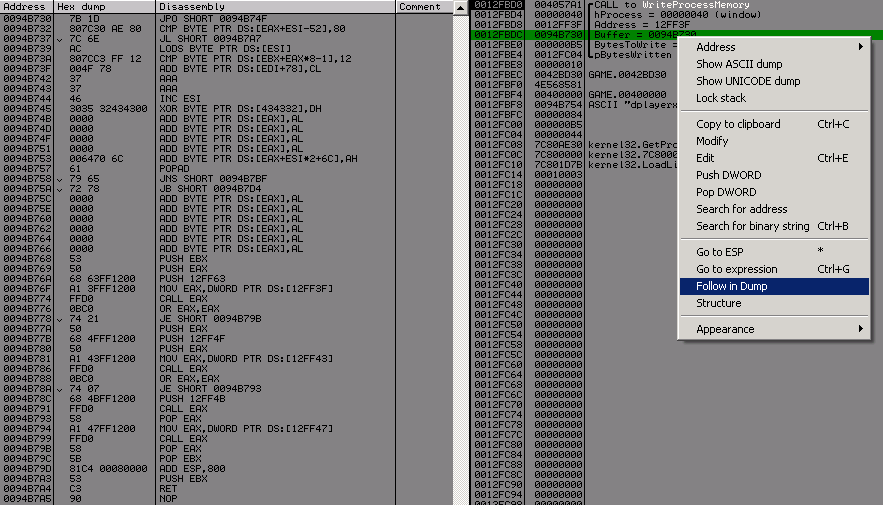
You can notice the different call eax, LoadLibrary("dplayerx.dll"), GetProcAdress("Ox77F052CC"), then it call this function, for decrypting all sections of the icd file (it uses TEA ).
So if we want to attach a debugger to the icd process, remember my last post about EBFE or CC tricks, and notice the PUSH EBP RET (0x53C3), we can replace these opcode by EBFE,
then attach olly to the process.
We can see that if DEP is on, the game will crash (failed?).
So let's replace (0x53C3 by 0xEBFE), continue the program (ResumeThread() will be called) and open a new ollydbg and attach to this process.
Then pause the program ( F12 ), and replace JMP SHORT 0012FFB2 by PUSH EBX RET.
Trace the code you will arrive into kernel32, continue tracing, then at the entry point of the icd file.

So we are here and the fun part can begin :] :
006854E3 > 55 PUSH EBP
006854E4 8BEC MOV EBP,ESP
Call redirection
In Safedisc, all the calls to Kernel32 or User32 api are done through dplayerx.dll.
Let's take an example :
00685509 FF15 54826900 CALL DWORD PTR DS:[<&KERNEL32.CreateDirectoryA>] ; DS:[00698254]=01213423
...
01213423 60 PUSHAD
01213424 68 67000000 PUSH 67
01213429 68 00000000 PUSH 0
0121342E FF15 44342101 CALL DWORD PTR DS:[1213444] ; dplayerx.00D4E9D0
01213434 83C4 08 ADD ESP,8
01213437 61 POPAD
01213438 FF25 3E342101 JMP DWORD PTR DS:[121343E] ; Jump to api
You can notice a call to dplayerx.00D4E9D0, with a stack where we pushed 0x67 and 0x0.
What does it mean ?
It simple, 0x0 is for telling the routine that it's a kernel32 api, and 0x67 is the number of the api to call.
This routine will GetProcAddress() for the specified api, then jump to it.
And what about User32 api ?
00D750B7 60 PUSHAD
00D750B8 68 43000000 PUSH 43
00D750BD 68 01000000 PUSH 1
00D750C2 FF15 D850D700 CALL DWORD PTR DS:[D750D8] ; dplayerx.00D4E9D0
00D750C8 83C4 08 ADD ESP,8
00D750CB 61 POPAD
00D750CC - FF25 D250D700 JMP DWORD PTR DS:[D750D2]
Same thing but we pushed 0x1 instead of 0x0, and jump to the resolved address.
Fix this
The problem is if we dump the executable and try to reconstruct the iat, it will fail, because all calls to kernel32 or user32 api must be solved by dplayerx.dll :
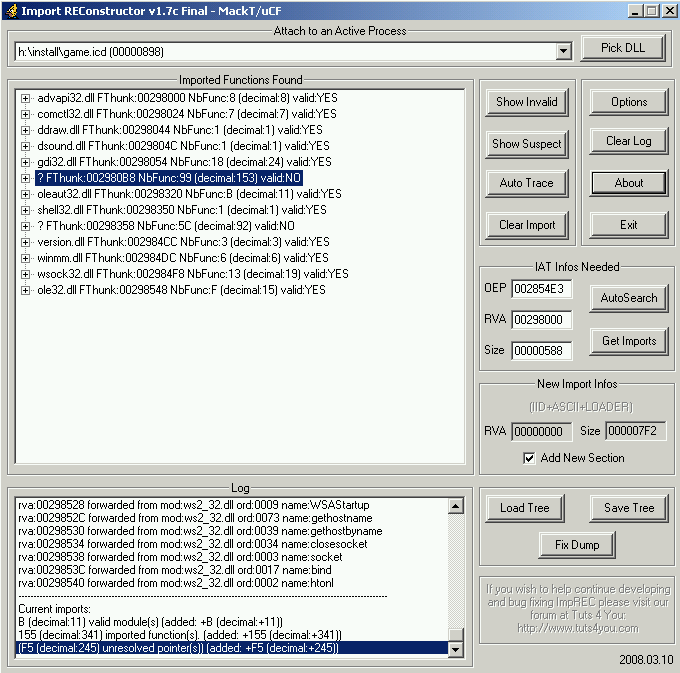
So why not using their own routine (dplayerx.00D4E9D0) to fix our iat :] ?
Let's take a look at rdata section for all kernel32 redirection :
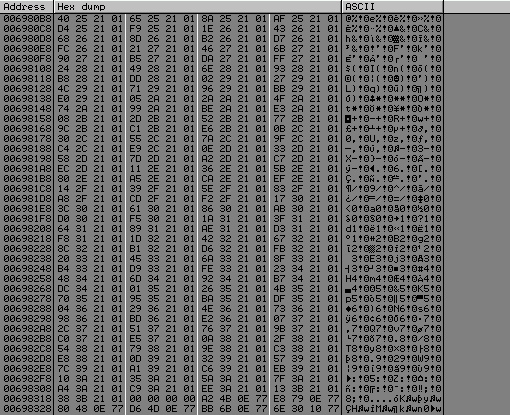
It starts at 0x6980b8 and ends at 0x69831b
>>> hex(((0x69831b - 0x6980b8) / 4) + 1)
'0x99'
So we got 0x99 call to fix, like ImportRec said us : NbFunc:99(decimal:153) Valid:NO.
Be careful because the rdata section is not Writable, go fix it :
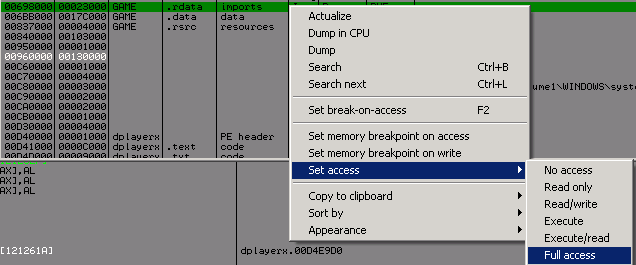
No choose any memory region wich is executable and code this :
01213DEB 33DB XOR EBX,EBX ; we start with api 0
01213DED BA B8806900 MOV EDX,006980b8 ; Start of the rdata kernel32 redirection
01213DF2 60 PUSHAD
01213DF3 53 PUSH EBX
01213DF4 6A 00 PUSH 0 ; Kernel32 api
01213DF6 FF15 61252101 CALL DWORD PTR DS:[1212561] ; dplayerx.00D4E9D0
01213DFC 83C4 08 ADD ESP,8
01213DFF 890D 00009500 MOV DWORD PTR DS:[950000],ECX ; save the api address
01213E05 61 POPAD
01213E06 8B0D 00009500 MOV ECX,DWORD PTR DS:[950000]
01213E0C 890A MOV DWORD PTR DS:[EDX],ECX ; fix the api address in rdata
01213E0E 43 INC EBX ; next api
01213E0F 81FB 99000000 CMP EBX,99 ; no more api to fix ?
01213E15 74 05 JE SHORT 01213E1C
01213E17 83C2 04 ADD EDX,4 ; next api address to solve
01213E1A ^ EB D6 JMP SHORT 01213DF2
01213E1C CC INT3 ; please stop
When we got out of the func dplayerx.00D4E9D0, ecx equals the address of api wich will be called, so we save this in a memory region writable.
And then we fix this in the rdata section for each api for kernel32.
Set a new origin at the begining of your code and run it.
Olly break, and our rdata look pretty nice :
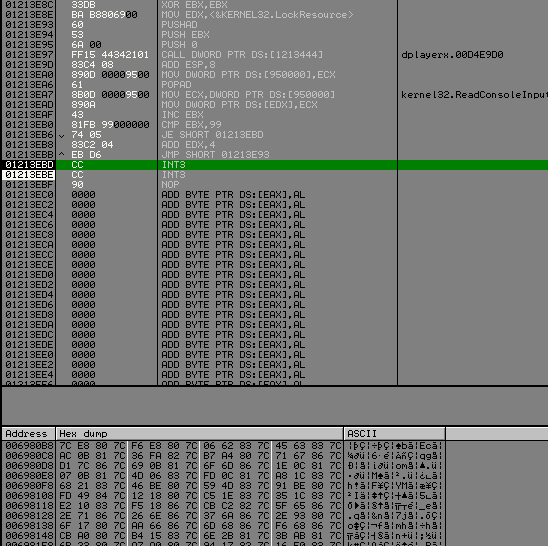
We need to do the same thing for user32.
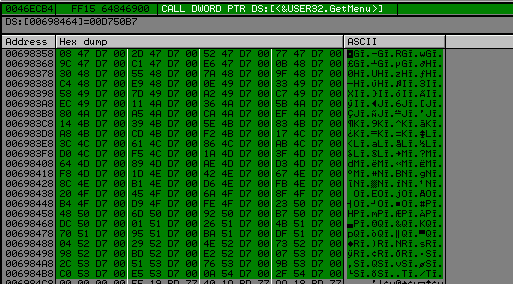
>>> hex(((0x6984C4 - 0x698358) / 4) + 1)
'0x5b'
We will use the same code as above but change the start value of edx to 0x698358, PUSH 0 to PUSH 1 and cmp EBX, 99 to cmp EBX, 5C.
Run it and now come back into import rec :
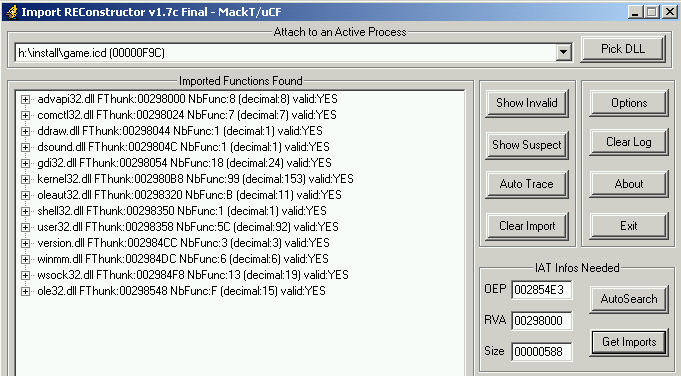
Everything is ok, we can dump and fix the iat without problems. Safedisc has been removed correctly :].
BUT ! there is an another problem when we launch the game it ask us for the a cd ....
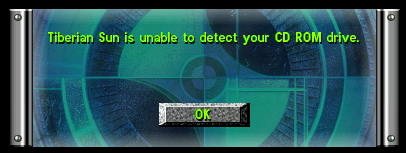
This is not the purpose of the article but you should copy all *.mix files form the cd into the tiberian sun directory and look around 0x004DCBAE ;)
Conclusion
I know over the internet there are several unwrappers for safedisc but with closed source, so i'm actually studying differents versions of safedisc, for writting a similar tools but with source included.
Useful links
- http://www.woodmann.com/fravia/artha_safedisc.htm
- http://www.winehq.org/pipermail/wine-users/2002-April/007910.html
Pages : 1

